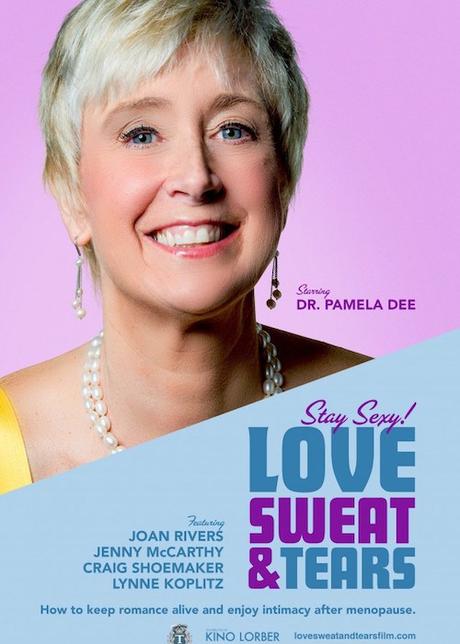
love, sweat, and tears
Last week, I posted Part I of Dr. Pam’s openhearted sharing of her journey from gynecologist to menopause healer. In Part II, she tells us more about her journey and how being a caregiver changed her forever. I am profoundly grateful that she has chosen to be naked and unafraid in order to help others. Be sure and click on the info at the end of the post about her breakout film “Love, Sweat, and Tears.”
An Obstetrician’s Transition to Menopause and Survivorship Medicine Part II
I became a caregiver to my husband when I stopped obstetrics in 2005. He was an OB/GYN himself. Our lives changed immediately after his first surgery and radiation therapy. Our intimate relationship ceased immediately. We tried to remain intimate, and we sought help. We did ask one of his physicians for assistance, and unbelievably, he said, “Well, you are alive, right?” Yes, he was alive, and we appreciated the fact that he was alive. But, we lost a great part of our relationship.
We lost our closeness and our ability to show our love to one another. It was a terrible loss, and we grieved the loss in different ways. I didn’t realize that he continued to try to “fix” things. About 2 weeks before he died, I was getting the laundry together and checking his pockets. I didn’t realize that he was standing behind me when I took a couple of packets out of his pocket. I put some glasses on and saw that it was packets of testosterone. I turned around and saw him there and said the worst thing in the world. I said, “What are you doing? I don’t care about that!” Well, he put his head down, and I know that he was tearful. He said, “I wanted to try.” As he walked away, I realized that he took my words wrong. I meant that it was not a factor in how much I loved him.
I wish that I could have that moment back. The more that I tried to explain my thoughts, the more that I made the situation worse. After he died, I have had years to think about this situation. Here, you had a married couple – both of which are gynecologists – that have not talked for 5 years about the fact that we could not have sexual intercourse. If we can’t talk about it, then I bet lots of people in our situation have absolutely no hope of talking about it. How sad is it that two gynecologists can’t talk to each other about what we could do to help our problem. How sad is it that two physicians went to another physician to ask if there was any way to help us get our intimate lives back, and none of us knew what to do. I mean to change that fact. I understand that one of the hardest things for a physician to say is, “I don’t know what to do.” I mean to change that fact, too. It is terrible to have to accept that a bad or terminal illness means the end of your sexual relationship.
Taking care of another adult is the hardest thing that I have ever done in my life. Medical school, residency, and having twins were a breeze compared to this responsibility. This is something else that I completely missed during the early years of my practice. I didn’t understand what it was like to be a caregiver. I didn’t understand the physical and emotional wear and tear that was required of my body and mind. When a patient came in and told me that she was taking care of a husband or parent, I would immediately go into sympathy mode – and I meant it. I asked who their doctor was, how they were progressing, and the plan of care. I commented on the physician taking care of them and encouraged them to hang in there. I completely missed the fact that they were hurting and overwhelmed.
Whether someone is taking care of a spouse, family member, or a parent, they become the “mother.” It is difficult to take complete care of another adult. The patient is angry about their situation and frequently those that are closest to them take the brunt of the anger. As with so many circumstances, life experience is a brutal and uncompassionate teacher. After being a caretaker, the object of my sympathy reversed – I focused on the caregiver. I asked if they had any help. I asked if they ever got a break from their caregiving. Usually, there is not, but someone who understands their “new” life and their “new normal” is a welcome change. No one can help them, and they know it. However, having someone even acknowledge their responsibility, fear, and stress is comforting.
For almost twenty years, I was a good obstetrician. I thought I had the best job in the world, and at the time, I did. For the last ten years, I have become a (hopefully) great gynecologist, gynechiatrist, intimacy, menopause, and sexual medicine physician, intimacy counselor, and survivorship gynecologist. I have impacted lives in a different way. I know that I helped so many women as an obstetrician; I loved them and I know that they felt the same about me. However, if I am truly honest, my obstetrical career satisfied me. The gynecology career that I ended up with satisfies the reason that I went to medical school: my desire and need to help others.
Pamela Dee Gaudry, MD, NCMP
NAMS Certified Menopause Practioner
Medical Sex Therapist
Survivorship Medicine Physician
(and I’m still an Obstetrician

You can host a screening at a theater near you of Dr. Pam’s film, “Love, Sweat, and Tears” through Gathr – they handle the details, it costs you nothing – you get your friends to go and promote the film. Click here for details.

